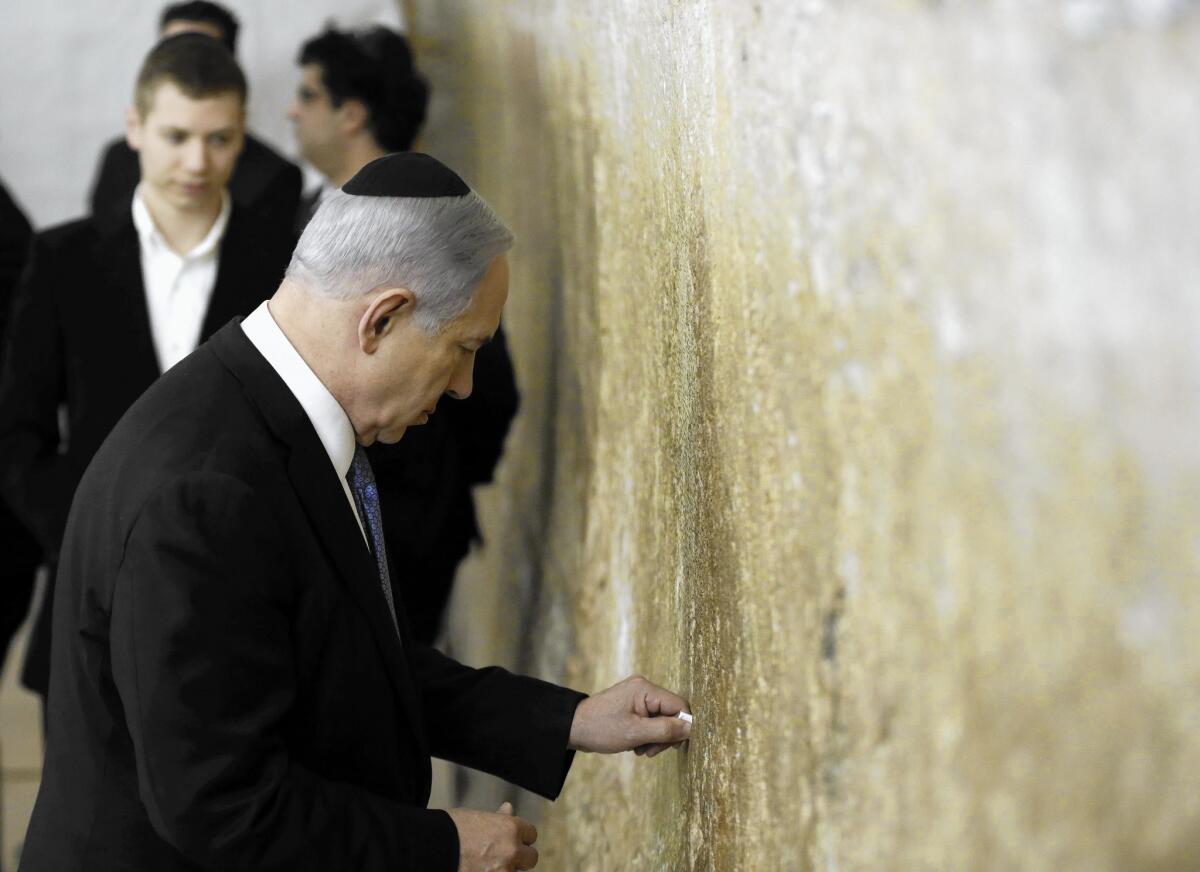Netanyahu won election, but now faces challenge of Israel’s reality

Prime Minister Benjamin Netanyahu, having secured a come-from-behind election victory for his conservative party, now faces an array of problems at home and abroad, some of them exacerbated by the ugly tone of the final days of the campaign.
Hours after the vote tally pointed to a comfortable victory for Netanyahu’s Likud, the prime minister announced that he would try to form a ruling coalition as soon as possible, a narrow grouping built around partnerships with natural allies, including right-wing and religious parties.
His main opponent, Isaac Herzog, indicated that he would remain in the opposition rather than joining a “unity government” with Netanyahu, declaring that his left-center Zionist Union would serve as “an alternative in every field” to the more hawkish prime minister.
Later, somewhat less diplomatically, his running mate Tzipi Livni described the prospective Netanyahu government as a “coalition of horror.”
Conceding defeat, Herzog — whose party ran on a platform of confronting social issues such as the skyrocketing cost of living and seeking to engage the Palestinians in dialogue — suggested that Netanyahu had his work cut out for him on a variety of fronts, including the economy.
“I wish him luck, but it should be clear to Israel’s citizens: The challenges are the same challenges, the problems are the same problems,” Herzog said. “Nothing has changed.”
To cobble together the requisite 61 seats in the 120-member Knesset, Netanyahu said, he is consulting with the pro-settlement Jewish Home, led by Naftali Bennett; the new center-right party Kulanu, led by former Likud Cabinet Minister Moshe Kahlon; and hard-line nationalist or ultra-Orthodox parties.
Bennett will be a holdover from the last government, which collapsed when Netanyahu fired Finance Minister Yair Lapid of the Yesh Atid party and Livni, who was justice minister.
The changes will mean that large segments of society will probably feel alienated from his government: those who hope for peace with the Palestinians, secular-minded Israelis, and the country’s Arab minority, which was the target of a scare-mongering election day video from Netanyahu about Arab citizens going “en masse” to the polls, and urging his own right-wing backers to come out to counter them.
Not incidentally, an Arab political alliance emerged as the third-largest party, its popularity driven in part by a pervasive sense among Israel’s Arab citizens of being marginalized and downtrodden.
After the vote, the prime minister, as is his habit, draped himself in the mantle of not only all Israelis, but of the Jewish people as a whole.
Hours after a triumphal early-morning speech during which supporters chanted, “You’re a magician!” Netanyahu paid a somber visit to the Western Wall, Judaism’s holiest prayer site, and tucked a note among the enormous stones.
“I am moved by the weight of the responsibility which the people of Israel have placed on me,” he said afterward, alluding to thousands of years of Jewish history associated with the site.
Israeli commentators were quick to lay out the pitfalls awaiting Netanyahu, who is widely perceived as having alienated Israel’s most important ally, the United States, together with other Western governments, with intransigence on issues such as Palestinian statehood. On the eve of the vote, Netanyahu ruled out a state between the Mediterranean Sea and the Jordan River, although he had six years ago endorsed one in principle.
“It is a government that will lead us to diplomatic deadlock, to a binational state, and to international isolation,” columnist Ben-Dror Yemini wrote in the Yediot Aharonot daily. “Even if there is no international boycott on Israel, the pressure will only increase. The creeping boycott will continue. Security expenses will only increase.”
In a flurry of postmortem analysis, many hailed Herzog, the mild-mannered scion of a distinguished diplomatic and rabbinical family, for having fought an uphill battle against Netanyahu, but some argued that the prime minister, whose popularity had been slipping, was ripe for toppling — by a stronger candidate.
“Netanyahu went into these elections more vulnerable than ever,” Ben Caspit wrote in Maariv. “Hated, persecuted, almost isolated — all you had to do was give him the knockout punch.”
Palestinians considered Netanyahu’s election-eve renunciation of support for Palestinian statehood as an unmasking of sorts, as the peace process has gone nowhere during his tenure. Saeb Erekat, who served as a negotiator for the Palestinians in talks that broke down a year ago, told Voice of Palestine radio, “It is very clear that there is no partner in Israel for the peace process.”
Netanyahu’s triumph is an additional headache for the Palestinian Authority, which now faces pressure from its own public to refuse any dealings with a Netanyahu-led government. Even the militant group Hamas got in on the act, calling on the Palestinian Authority to reject any talks with Israel because of Netanyahu’s electoral success.
“The election of Netanyahu, who does not believe in any solution with the Palestinians, demands … severing all ties with the occupation,” said Hamas spokesman Husam Badran.
Twitter: @laurakingLAT
Times staff writer King reported from Tel Aviv and special correspondent Sobelman from Jerusalem. Special correspondent Maher Abukhater in Ramallah, West Bank, contributed to this report.
More to Read
Sign up for Essential California
The most important California stories and recommendations in your inbox every morning.
You may occasionally receive promotional content from the Los Angeles Times.










